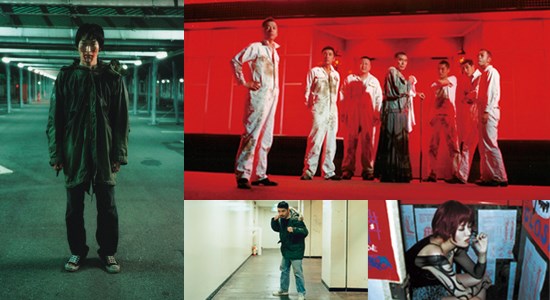
Written by Hayley Scanlon on 03 Jan 2017
Distributor Third Windows Films • Certificate 18 • Price £19.99
Toshiaki Toyoda began his career as a screenwriter working with the more experienced Junji Sakamoto, but it wasn’t until the release of his indie debut, Pornostar, in 1998 that he really began to make his mark. Toyoda’s films stood in sharp contrast to the contemporary mainstream with their intense tone, oblique storytelling and use of slow motion music sequences coupled with surreal imagery. This trio of early efforts put together by Third Window Films emphasises the common thread which runs through the first half of Toyoda’s career - disaffected youth and the various ways young men go to war with the world to quell their inner demons.
Toyoda’s debut film, the intriguingly titled Pornostar, kicks the cycle off in style with the tale of a near silent, alienated and isolated youngster stalking the city streets in a one-man crusade against the “unnecessary” yakuza. Toyoda gives him a mirror image in the form of a cowardly yakuza stooge and then introduces a complementary female pair, one of whom offers peace and salvation and the other death and violence. Starting as he meant to go on, Toyoda prioritises visual symbolism over more conventional narrative in which knives fall from the sky like rain and a skateboard may take you all the way to the summer of love.
Toyoda’s second feature and his only documentary to date is an exercise much closer to realism, though he does admit to staging some of his material or otherwise manipulating his footage. Taking its name from the lynchpin of its cast of down on their luck boxers, Unchain follows four young men from Toyoda’s home town of Osaka as they contend with battles both within the ring and out. Like many Toyoda heroes, Unchain’s boxers are looking for a release in the ring; a way to be free even whilst pinned in by its invisible walls. But real life is not like the movies and so what they do or don’t find there is not always what might have been expected. Toyoda mainly sticks to a talking heads approach but gets up close and personal for the bouts and adds occasional doses of surreal flair in street scene pillow shots.
The next film included in the set, 9 Souls, unites both these films in recreating the classic prison break formula but ensuring that each of its titular lost souls remain firmly within their self-imposed prisons even whilst breaking out of a literal jail cell. Once outside, the nine former inmates take off on a kind of road trip, making use of the opportunity of returning to mainstream society to live the lives they’d always wanted to live but had always been denied for one reason or another. These are small dreams - opening a countryside cafe and marrying a pretty waitress, or being able to attend your daughter’s wedding and give her a wedding present in person. Yet generally what the prisoners find on the outside is more of the thing they most feared - rejection, and at best all they are able to achieve is a temporary reprieve from their ongoing despair. Among the most poetic and surreal of all Toyoda’s works, 9 Souls swaps the rage filled confusion of Pornostar for the weary resignation of maturity.
Where the earlier part of Toyoda’s career had focused on young men trapped within themselves by constraining social economic circumstances, his next few films would see the canvas widening. Unfortunately, a run in with the law shortly before the release of his fourth film, strange family drama The Hanging Garden, led to an enforced break from the director’s chair but recent years have seen Toyoda return albeit with some more commercial ventures including a sequel to Miike’s Crow’s Zero franchise. Once again we have Third Window to thank for unearthing these earlier efforts, unfairly neglected on their time of release, these early films are now restored in HD and offered in a luxury package accompanied by a host of special features including two informative audio commentaries neatly situating Toyoda’s work among that of his contemporaries. Though the selection of films may seem diverse, moving from indie drama to arty documentary and finally surrealist parable, it perfectly reflects the course of Toyoda’s career as his stylistic and narrative concerns gradually begin to merge, forming his trademark style of abstract visual poetry married with a pounding, youthful urgency.
Japanese with English subtitles. On-disc extras include: New audio commentaries by Midnight Eye's Jasper Sharp and Tom Mes; new interview with Toshiaki Toyoda; "Making Of" features; music videos and other extras from the films' original releases.
posted by Richard Durrance on 12 Feb 2026
posted by Richard Durrance on 10 Feb 2026
posted by Richard Durrance on 07 Feb 2026
posted by Richard Durrance on 03 Feb 2026
posted by Richard Durrance on 27 Jan 2026
posted by Richard Durrance on 19 Jan 2026
posted by Richard Durrance on 08 Jan 2026
posted by Richard Durrance on 17 Dec 2025